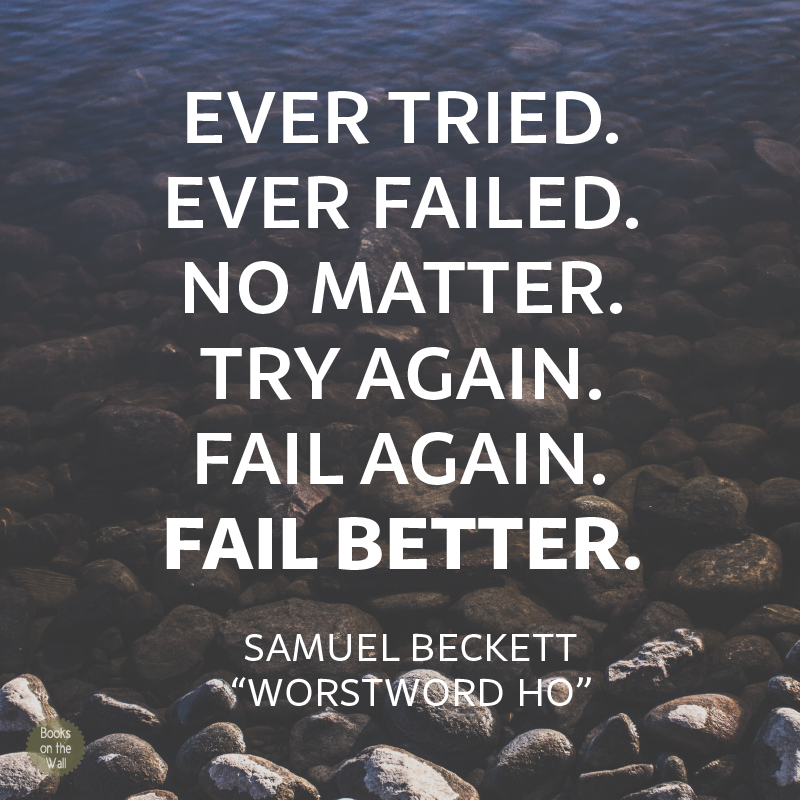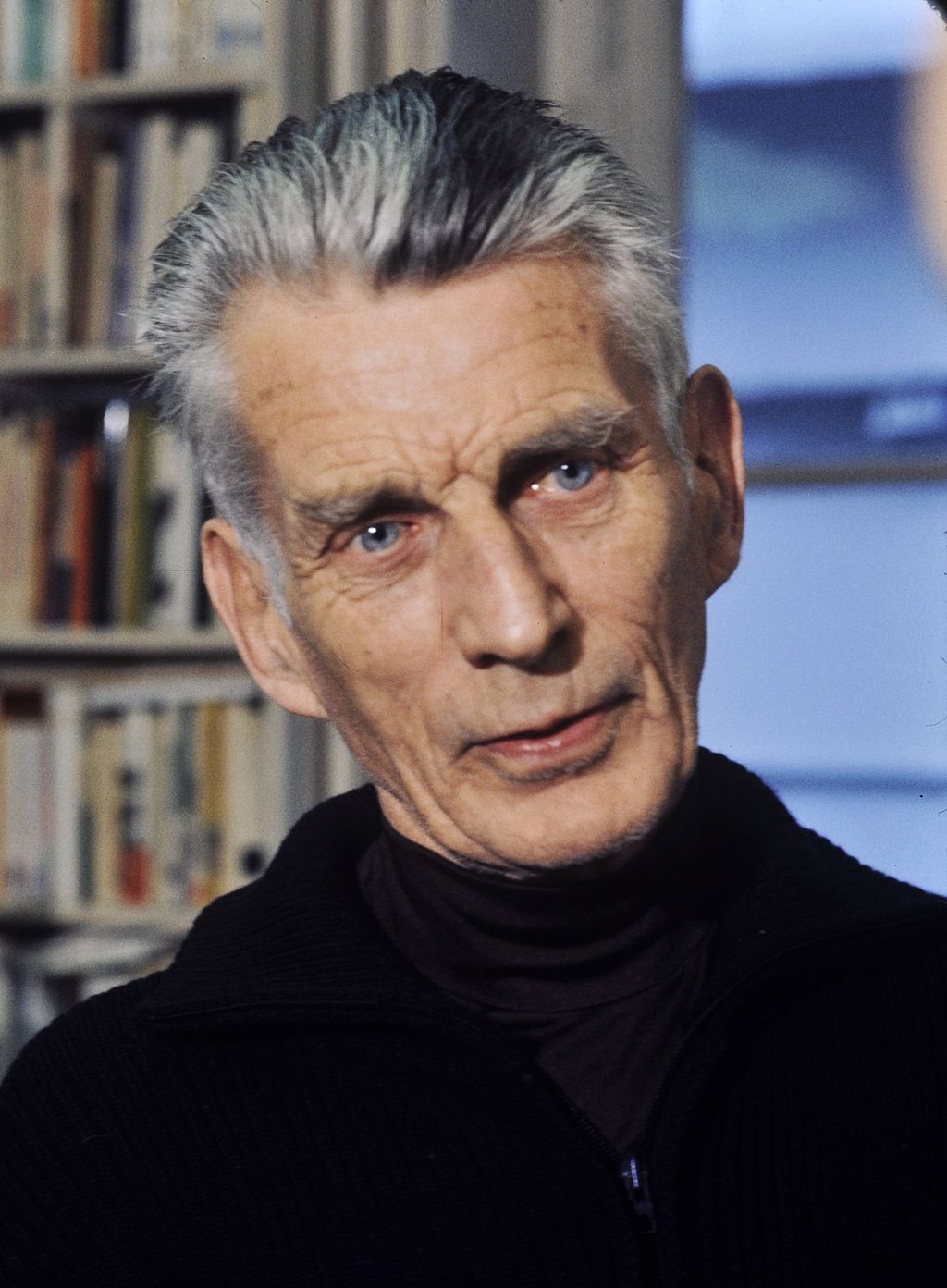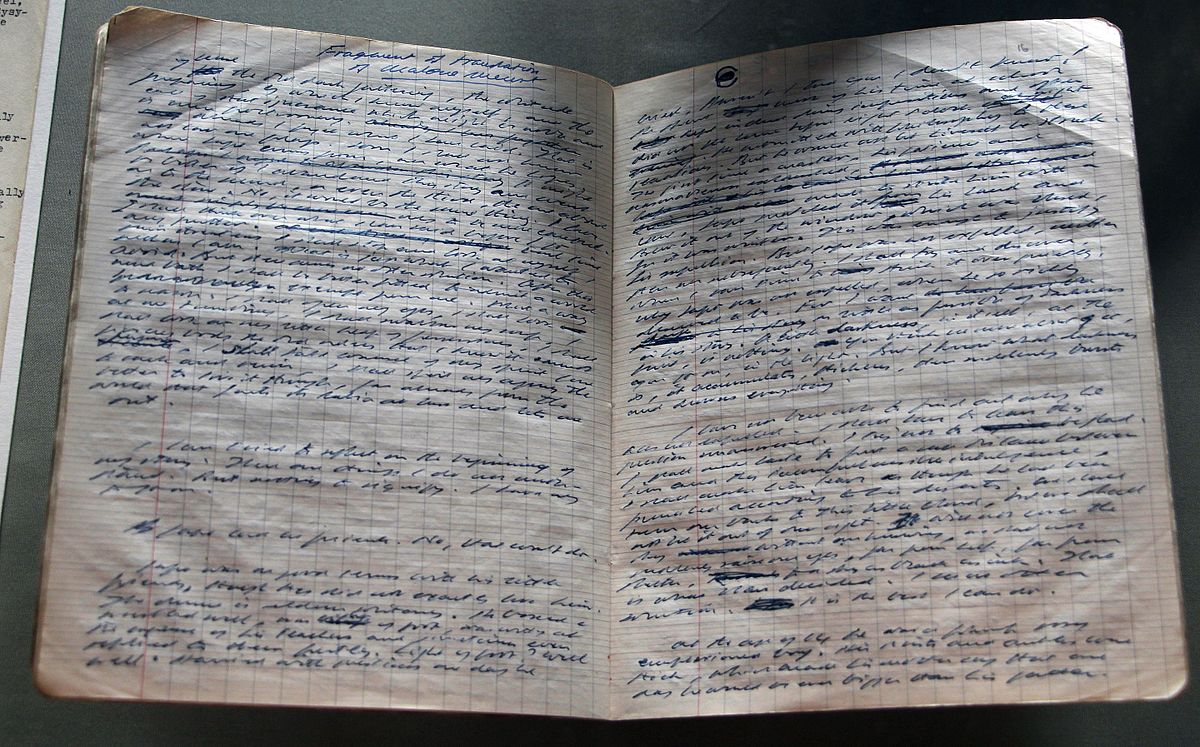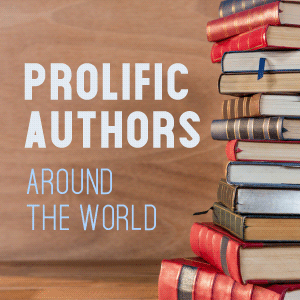Samuel Beckett: Fail Better and “Worstward Ho!”
Today we’re featuring a Samuel Beckett quote that has gained immense popularity in recent years. You may not have known that this quote comes from Irish author Samuel Beckett, but there’s no doubt you know the words.

Even if you aren’t involved in tech, entrepreneurship, lifehacking, or other such digital-age ubiquities, you’ve probably heard the most famous part of this Samuel Beckett quote: “Fail better.”
The “Fail Better” Quote by Samuel Beckett
The “fail better” quote was originally published in Samuel Beckett’s short piece of prose entitled Worstward Ho!, his second-to-last work ever published. The full Samuel Beckett quote reads like this (and by “full,” we really mean the part that gets repeated):
“Ever tried. Ever failed. No matter. Try again. Fail again. Fail better.”
By itself, you can probably understand why this phrase has become a mantra of sorts, especially in the glamorized world of overworked start-up founders hoping against pretty high odds to make it.
Even outside of the business development niche, this quote does sound inspiring. Right?
We think so, too. That is…until you read the rest of it.
Is the “Fail Better” Quote Really Inspirational?
Here’s the continuation of that Samuel Beckett quote, the part that immediately follows the famously catchy bit (our emphasis added):
“First the body. No. First the place. No. First both. Now either. Now the other. Sick of the either try the other. Sick of it back sick of the either. So on. Somehow on. Till sick of both. Throw up and go. Where neither. Till sick of there. Throw up and back. The body again. Where none. The place again. Where none. Try again. Fail again. Better again. Or better worse. Fail worse again. Still worse again. Till sick for good. Throw up for good. Go for good. Where neither for good. Good and all.”
As this markedly darker snippet of text demonstrates, Worstward Ho! seems to have nothing to do with positivity, motivation, or progress.
In fact, it seems that the only recompense Beckett’s narrator can come up with for the absurdity of existence is to “fail better” the next time.
Not exactly inspiring, right?
The Meme-ification of the “Fail Better” Samuel Beckett Quote
In Beckett’s bleak worldview, life is already a grand failure (or a tragi-comedy, if you’d prefer) in which we are all, like the narrator of Worstward Ho!, sitting in an inexplicable “dim void.” The fact that this Samuel Beckett quote has been taken so far from its original roots is pretty fascinating.
Mark O’Connell, a writer for Slate, describes the ironic meme-ification of the “fail better” quote like this:
“The entrepreneurial fashion for failure with which this polished shard fits so snugly is not really concerned, as Beckett was, with failure per se—with the necessary defeat of every human endeavor, of all efforts at communication, and of language itself—but with failure as an essential stage in the individual’s progress toward lucrative self-fulfillment.”
As O’Connell notes, Samuel Beckett was interested in failure, full stop. Not failure as a necessary path toward riches, or fame, or (everyone’s favorite buzzword) “innovation.” Just failure.
The “Dim Void:” Beckett’s Worstward Ho!
Except for this one “fail better” quote, nearly every other snippet from Westward Ho! reflects the real Samuel Beckett: brooding, morbid, and completely avant-garde.
Indeed, far from encouraging techie CEOs to achieve their greatest potential, Beckett’s primary obsession in Westward Ho! is “the void”:
“Longing that all go. Dim go. Void go. Longing go. Vain longing that vain longing go.”
In many ways, this text can be seen as an extended meditation on the inexplicable nature of being and not-being. Beckett’s narrator seems to be trying to work out the paradox of emptiness and presence, of birth and death.
Worstward Ho! vs. Westward Ho!
The title of Worstward Ho! is a riff on the 19th century novel Westward Ho! by the English novelist Charles Kingsley, offering a very contrasting view of life.
While the phrase “Westward Ho!” is associated with expansion, growth, and great optimism for the future, Beckett’s title reminds us that, ultimately, we are all journeying “worstward” towards the grave…
…and perhaps back again. It’s not quite clear, but some people see the theory of reincarnation in this work, just as “metempsychosis” is a major theme in Joyce’s Ulysses.
Unreliability of Language
Another important theme in Worstward Ho! (again, something skipped over in the famous Samuel Beckett quote) is the narrator’s lack of faith in language. Later in the piece, Beckett writes the following:
“With leastening words say least best worse. For want of worser worse. Unlessenable least best worse.”
This phrase succinctly encapsulates Beckett’s later minimalist aesthetics. You can also see the unreliability of language as “word” almost slips into “worse” in this quote.
What Does Worstward Ho! Even Mean?
A few literary critics have tried to classify Worstward Ho! as a novella, but it’s quite difficult to make out a clear plot in this text. Readers who support the theory that Worstward Ho! is a novella point out that this text is mainly about an old man, an old woman, and a child visiting a graveyard. It’s left up to us, perhaps, to fill in the blanks surrounding these three figures.
As with many of Beckett’s other works, there’s a great deal of disagreement over what Worstward Ho! actually “means.” The woman, man, and child might be symbolic of stages in the human condition. Or they might not.
As with any other work of fiction, readers only get out of Beckett’s text as much as they put into it.
Samuel Beckett: So Much More Than “Fail Better”
A Nobel Prize-winning author, Samuel Beckett’s been called many things: Avant-garde. Dark. Intense. Depressive.
But inspiring? Not so much.

Samuel Beckett Portrait [Public Domain], via Wikimedia Commons
In fact, Morris Dickstein at The New York Times Book Review says this of Beckett’s life and work:
“He arrived early at an extremely bleak view of life and a sense of the peculiarity of his own detached and morbid temperament.”
To understand more about this famous Irish author—and see what’s beyond his out-of-context “fail better” quote—let’s take a little deeper look at his life.
Friendship with Joyce and WWII
Samuel Beckett was born in 1906 in Dublin and was raised in a Protestant household.
After receiving his BA in Romance languages at Trinity College, Beckett moved to Paris where he became close friends with fellow Irish writer James Joyce. Beckett learned a great deal about writing from Joyce and helped the great author with his last novel Finnegans Wake.
When World War II broke out, Beckett remained in France and worked with resistance fighters. For his efforts, Beckett was awarded the Croix de Guerre from the French government in 1945. Before the war, Beckett mainly wrote essays on literary criticism. The only work from this period students read today is Beckett’s analysis of French author Marcel Proust.
Avant-Garde Theater and Literary Development
Most literary historians agree that Beckett’s first great novel was Watt, which was published in 1953. Beckett then published a major trilogy of novels called Molloy, Malone Dies, and The Unnamable.
But it wasn’t until he produced his classic absurdist drama Waiting For Godot that Beckett became a celebrity of Avant-Garde theatre.
Beckett spent the rest of his life mostly moving between the Marne Valley and Paris. He was a famously reclusive writer who rarely gave interviews, although he was generous with his time for serious artists that sought him out.
As he matured, Beckett tried to parse down his prose to the bare essentials. In fact, some of Beckett’s later works (like the 30-second play “Breath”) had no words at all.
Beckett’s style of prose went in the exact opposite of his mentor James Joyce. Whereas Joyce’s works expanded over time, Beckett’s later texts had fewer and fewer words. A few of the great works from his middle and late career include:

Manuscript of Embers, a one-act radio play by Samuel Beckett, by Dmitrij Rodionov, via Wikimedia Commons
Nobel Prize in Literature and Later Life
The Nobel Prize Committee awarded Beckett the Nobel Prize in Literature in 1969. Although he accepted the award, he didn’t make a speech and he generously gave away all of his prize money.
Beckett passed away in 1989, just a few months after his wife Suzanne Déchevaux-Dumesni. The two were buried in the French capital’s famous Cimetière de Montparnasse.

Samuel Beckett Bridge, Dublin, by Surrell, via Wikimedia Commons
To honor the great writer, Parisian officials (perhaps ironically) named the Allée Samuel Beckett near the infamous Catacombs in his honor. In 2007, Dublin also honored the influential writer with the Samuel Beckett Bridge over the River Liffey.
Mostly all of Beckett’s works explore heavy themes:
- Death
- Memory
- Language’s relationship to reality
Although Beckett is often seen as a morbid writer, he often injects his own unique sense of Irish humor into many of his plays and novels. Much like Joyce’s work, many of Beckett’s texts are full of references to some of his favorite authors in the Western literary canon, especially Dante Alighieri.
Connections Between Beckett and Dante
Beckett was a great admirer of Dante’s poetry. It’s even possible that Beckett had the final lines of Paradiso in mind when he composed some sections of Worstward Ho!
As Dante stands before God in the finale to his grand epic, he utters these unforgettable verses:
Here force failed my high fantasy; but my
Desire and will were moved already—like
A wheel revolving uniformly—by
The Love that moves the sun and the other stars.
For Dante, as it seems for Beckett too, the highest happiness is to surrender all craving and, at least in Dante’s vision, to allow God to work through us. Unlike Dante, however, Beckett is living after the horrors of World War II and after the Nietzschean “Death of God.”
Just like us, Beckett is in an age far removed from the faith of the Middle Ages that inspired the soaring cathedrals all across Europe. Indeed, instead of building the grand cathedrals, we are living amidst their rubble. With these immense suffering of World War II at the forefront of his mind, Beckett suggests that there’s little to be hopeful for in the atomic age.
Interestingly, despite all of his pessimism about the human condition, there is still a faint desire in Beckett’s work for union with the divine.
Tips for Further Study of Worstward Ho!
Beckett’s Worstward Ho! is extremely rhythmic and relies on short staccato sentences.
When you listen to thisprose-poem, it almost sounds like an incantation and can have a hypnotic effect. If you do decide to listen to this text from a trained reader, then you will want to hold a copy of the poem in your hand to keep track of Beckett’s wordplay.
A few words Beckett switches around in the piece include the pairs “know”/”no” and “two”/”too.” Also, later in the text, Beckett uses the word “prey,” which could be mistaken for “pray” if you’re just listening to the poem.
There are many excellent readings of Worstward Ho! online. You can also find Beckett’s original Worstward Ho! text alongside helpful glosses by Colin Greenlaw on this webpage.
“Fail Better”: What Does It All Mean?
Here at Books on the Wall, we love digging into quotes and all things quote related—from what work the quote came from, what the author meant by it, how modern society has interpreted it, and whether the supposed author even wrote the quote in the first place.
When you start looking deeper into the many quotes that float around our collective conscience and the internet (and in this case, on tennis player Stan Wawrinka’s tattooed arm), you’ll see pretty quickly that there’s always more to the story than the little bit of text that happened to become famous.
And by now, you’ll realize that this is definitely true of this particular Samuel Beckett quote.

And this all raises an interesting question: Does a quote’s context matter?
If not for the misplaced fame of this Samuel Beckett quote, tons of people would never have even heard of this groundbreaking Irish author. Plus, it could be argued that—despite its undisputed out-of-contextness—the “fail better” quote has truly inspired people, maybe even changed lives.
So does it matter that its author would probably cringe to learn how commercialized and, well, positive it’s become? How much should an author’s original intent color our view of his or her words?
In the end, we really don’t know. It’s certainly an interesting question to consider.
What do you think? Let us know your thoughts in the comments below.





Leave a Reply
19 Comments on "Samuel Beckett: Fail Better and “Worstward Ho!”"
Thanks for this
Really enjoyed the reading and the framing.
Thanks Peter! 🙂
This is very good because sensitive to language and to the context for language. I understand the point about how a mistaken use of a famous quotation can still have some value but we live in a time when language is more and more misused. It is for that reason all the more important to be faithful to context whether it be the artistic context of a brilliant writer such as Beckett or simply of an ordinary conversation, or, especially in our time, a political debate
I completely agree. That was the original inspiration for this post — I saw that the quote was often being used in an inspirational way, but didn’t know the original context. Once I did some digging, I was surprised to find out Beckett’s actual intended message.
A great read, it reminds me of Philip Larkin’s most quoted ‘what will survive of us is love’, where the context of hopelessness, fear and loss is taken away to leave a positive romantic message which isn’t really there but makes people happy and ironically, hopeful.
That Larkin quote has a beautiful sentiment. Succinct, but very expressive at the same time.
I came here looking for the “meme” to unpacked and deepend. Instead, I found a well-reasoned and helpful examination — an exposure, perphas. Then, this delightful turn …
“And this all raises an interesting question: Does a quote’s context matter?”
Bravo … from top to bottom!
Thanks for the kind words, Aaron! ?
Thank you for this wonderful informative post. I have heard the “Fail better” quote for years, and (quite frankly) liked it’s inspirational quality. Then I heard it attributed to Beckett and thought, “no, that can’t be right — it’s too optimistic”, and thus found my way here when I went to check it out. Now I find that I still like the inspiration (and will, guiltily, continue to use the passage to stimulate students and colleagues), but will now also embrace and quote the full dark pessimistic counterpoint of Worstword Ho!
I’m glad you enjoyed the article, Steve! I agree in that I still find the original, out-of-context quote quite inspirational, even if I know that that’s not exactly how Beckett intended it.
Thanks. I came for the context of the quote, convinced if it was Becket it couldn’t really be positive. While the context you give has confirmed my doubt, I suppose we can’t deny other people the chance to be positive, and how to prevent quotes being taken out of context anyhow? Full scale plagiarism is wrong, but enthusiastic use of a few of other peoples’ words in the same order is pretty harmless. Language belongs to all of us, just attribute the original author.
You have reminded me to read more Becket.
Absolutely. The “Fail Better” quote has undoubtedly inspired many people to do great things. If taking a quote out of its context can push people to do more than they would otherwise, who are we to judge? Though it would certainly be interesting to get Beckett’s perspective on the public’s current interpretation of his quote! ?
beautiful collection of words
thank you for sharing
Glad you enjoyed the article, Shivangi.
After reading this very informative article, I clicked around searching for reinterpreted poetry lines and got quite the pageful of them. Thank you for your interesting text!
I would like to point that there’s a hidden author here: the “someone” who took that flower from Samuel Beckett’s depressing garden, as a politician selectively quoting to create a new reality. So I would call this quote as it stands… a derivative work of art, a repurposed creation, found art. The quote exists “as the quote”, and in my mind I can both value the original paragraph and context and the cut idea.
As it always happens with art, be it a piece of music or a famous portrait, it changes in the eyes, ears or mind of the beholder. With plastic art, it’s easier to remember that interpretation is personal, but with words, we still like to pretend that they have just one meaning. Does the quote somehow lie? About Samuel Beckett’s original intent, yes! About itself… it might even be true. To my ears, of course.
Excellent points. Though Beckett’s original intent was different than how the quote’s currently used, I agree that language evolves and can take on new meanings. Did Beckett intend for his words to be used inspirationally? No, I don’t think so. But that doesn’t mean that there isn’t value in “reinterpreting” his words or applying them in novel ways.
When the new £10 note came out in the UK it had Jane Austen on the back and a quote from Pride & Prejudice – “I declare after all there is no enjoyment like reading!”. I’d read P&P but didn’t recall that in the story this was said by a woman who certainly ISN’T a reader, and so folk questioned it’s suitability as a quote – or rather, they blasted it. I do wonder whether this was them trying to show how well read THEY are and whether it actually matters at all. Folk talk about quotes taken out of context – surely EVERY quote is taken out of it’s context – that’s what a quote is after all. I guess they’re therefore really asking “was this the original meaning of the quote?” Well, the original meaning of the quote by Austen would seem to be to indicate to the reader that Mrs Bingley (if it’s even her – I can’t remember) is a tad shallow. But I’ve come full circle. I initially wanted a quote which worked ‘better’ but I now think for a quote which Austen herself would agree with, it’s works very well.
With the hope that it won’t be too trivial to add one more ‘Thank you!’ to the already many for this very inspiring, thorough and informative article, I do it!
Thanks, Andrea for sharing these insights…I had wondered about the context of this quote for a while now. As a recovering alcoholic and peer-support specialist at an in-patient addiction recovery facility, I’ve blogged, shared, and quoted the “short version” of Beckett quite frequently. Knowing the context actually prompts me to use “Fail Better” even more. In my journey of recovery, my life was very much like Worstword Ho… a dark and depressing place with only brief glimpses of positivity, which ironically, DID come largely from taking a small glimmer of hope “out of context” and magnifying it into a bright shining moment. Long story made short: Whether taken in context or out, “Ever tried. Ever Failed. NO MATTER. Try again. Fail again. FAIL BETTER.” is a brilliant glimpse into the lifelong struggles of a recovering addict…I’ll definitely keep sharing this quote with clients and colleagues!